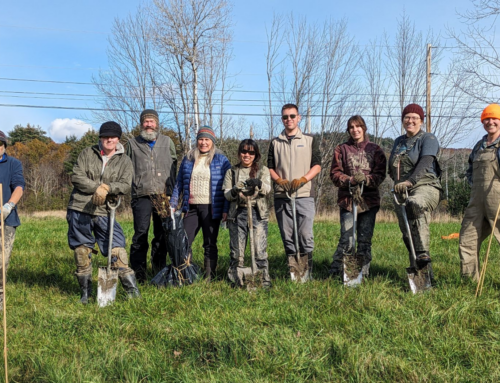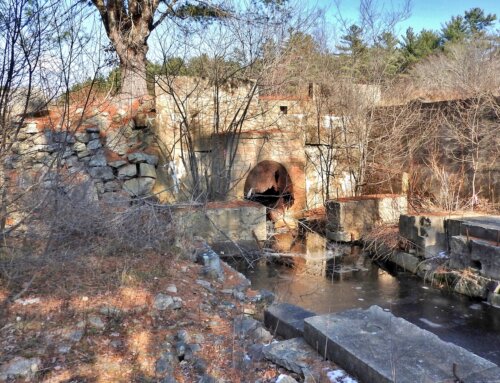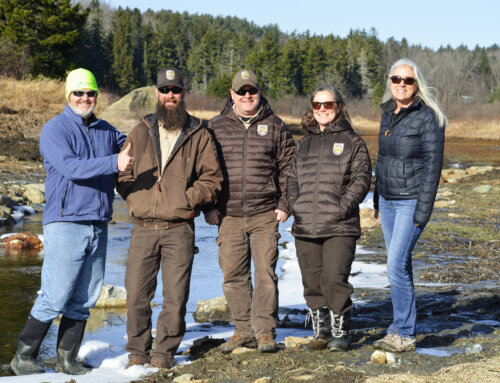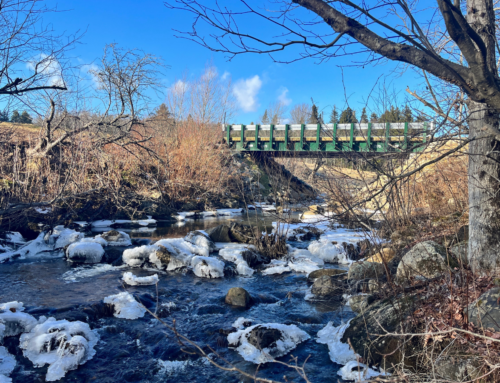Here’s your latest update on the hydropower relicensing process for the five facilities in MA, NH and VT along the Connecticut River: the Wilder, Bellows Falls, Vernon, and Turners Falls Dams and the Northfield Mountain Pumped Storage Station.
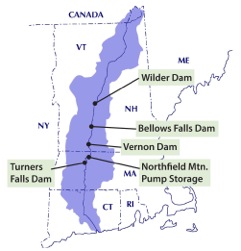
The next twelve months may be the most important time in the now seven-year-long relicensing of these five hydropower projects. Apparently, the companies are able to set their own timeline with the Federal Energy Regulatory Commission (FERC). It looks like Great River Hydro will be submitting their revised final license later this summer. And we think FirstLight is on track for an end of August submission.
Even during this pandemic, CRC is working hard to ensure that these applications include a good deal for the river and river communities.
CRC was able to work with experts to evaluate the potential of advanced battery storage. This alternative solution could be deployed to mitigate the loss of revenue if the peaking dams are required to convert to something closer to run-of-river operations, which is our hope.
The Trump Administration continues to knee-cap bedrock environmental statutes, including the National Environmental Policy Act and the Clean Water Act. While these executive orders, rules, or agency decisions will be challenged and hopefully blunted they are still dangerous.
Read the full update below, including links for more details.
Next Steps – Take Action!
The power of water & the power of words!
We expect that both Great River Hydro and FirstLight will submit revised final applications later this summer. Following this, the Federal Energy Regulatory Commission (FERC) will issue a process schedule that will include several opportunities to comment and to formally intervene. Anyone with thoughts or concerns can comment at any time and those comments become part of the public record for that project. Comments by local communities, the states, individuals and other stakeholders are important in communicating to FERC local concerns about the hydro facilities and their impact!
CRC will be developing additional recommendations in anticipation of these final applications to share our concerns and thoughts with the wider public. We encourage local citizens and municipalities to re-familiarize and educate themselves about the many studies and draft applications that can be found on the company websites:
Andrea and Kathy are available to update your local selectboard or conservation commission on the relicensing process and CRC’s concerns about the river. It is important that all parties re-engage as we come into this (hopefully) final stretch of this once-in-a-lifetime relicensing process.
CRC Opposes EPA’s Rule to Weaken State & Tribal Authority
The Trump Administration has finalized a rule that damages state and tribal authority under Section 401 of the Clean Water Act (CWA). Currently, CWA Section 401 gives states and tribes the right to veto or place conditions on activities requiring a federal license or permit that may result in a discharge. This ensures that projects, such as federal hydropower dam licensing, will not violate state water quality standards.
CRC in coordination with the national Hydropower Reform Coalition opposed this rule. Our comments stressed that the proposed changes would serve to make the permitting process more confusing and are contrary to the plain language and goals of the Clean Water Act to “restore and maintain the chemical, physical, and biological integrity of the Nation’s waters.” Read the submitted comments.
Thanks to the generous support of our members, we are fortunate to have the help of our nationally recognized attorney Ron Shems.
The states have also opposed this rule. We continue to work with our state partners to ensure they are ready for the coming twelve-month period in which they must make a 401 decision on the current relicensing process.
Battery Storage Analysis Submitted to FERC
For over a year, CRC has been exploring the feasibility of adding battery storage to hydroelectric facilities in support of moving these facilities to “run of river” operations. This would benefit the river and maintain the company’s access to more lucrative capacity and reserve electricity markets.
CRC worked with three Dartmouth engineering students on a preliminary analysis for Wilder, Bellows Falls, and Vernon Dams. We also contracted with Synapse Energy Economics to examine adding battery storage to Vernon to further test this idea. The analysis is small in scope, but shows that battery storage offers the companies options for operational changes that benefit the river.
We provided this battery report analysis to Great River Hydro and FirstLight for their consideration as they prepare their final applications. We also submitted it to the Federal Energy Regulatory Commission (FERC) docket as an alternative scenario in their analysis. View our reports
As we work with river advocates around the country we found that our our partners at Alabama Rivers Alliance were thinking along the same lines! They took heart from our analysis and submitted a study request to FERC to evaluate battery storage for a relicensing process in Alabama. FERC agreed and has asked AlabamaPower to evaluate how batteries could mitigate the current peaking operations that cause larger water level fluctuations.
Maybe FERC is on to this idea!
Erosion Resolutions Passed
Local communities are speaking up!
In an attempt to continue to educate the public in adjacent river towns about some of the effects of the hydro facilities, CRC worked to pass Town Meeting Resolutions in 2020. Resolutions passed in Lyme, Walpole, and Claremont, NH, and Northfield, MA. Read our suggested draft resolution language
Facilities in MA, Owned by FirstLight
There have not been settlement meetings with FirstLight in over a year and we don’t expect any in the near future.
At CRC, we’re working in good faith with informed and accurate positions to create a fair deal for the river, the public, and the hydropower companies. Unfortunately, we can’t say the same of FirstLight. Good faith means not trying to take advantage of regulatory loopholes, financial maneuvers and opaque shell companies.
FirstLight’s line staff is first-rate and we appreciate our collaborations. We just aren’t so sure about its corporate leadership. We are watching to make sure FirstLight doesn’t try to end-run career scientists by lobbying Trump’s political appointees in Washington, DC. And we know FirstLight has the money to do what needs to be done to improve our river. We’re working hard to make sure that happens because the public and the Connecticut River deserves better.
Read more about why CRC has concerns about FirstLight on our website and follow our social media for a weekly ‘Spotlight on FirstLight.’
FirstLight recently announced that Alicia Barton has been hired as their new CEO. Ms. Barton has a strong background in renewable energy having worked in a variety of MA state government positions and most recently for the Governor of New York in a similar role. We are hopeful Ms. Barton will be more engaging with stakeholders than her predecessor.
Facilities in VT / NH, Owned by Great River Hydro
In May of 2019, Great River Hydro (GRH) submitted an application to renew its certification under the Low Impact Hydropower Institute for the Vernon Hydroelectric Project. This certification needs to be renewed every five years, and it enables the facility to garner revenue under some state’s renewable energy portfolio standards. GRH’s license application stated that this revenue was worth $2 million dollars in 2016. CRC and resource agencies submitted comments on this application and again argued that the facility does not meet the low impact standard based on a number of issues, most notably that it is still a daily peaking facility.
Low Impact Hydropower Institute (LIHI) provided a decision in February 2020 that “The Vernon project’s LIHI Certificate has been extended until December 31, 2020 in order to allow for LIHI to address the unique situation of a recertification taking place at a time within a FERC relicensing when studies have been completed but no agency recommendations are available yet.”
Unlike FirstLight’s management, Great River Hydro’s leadership continues to maintain open lines of communication and is willing to hear our recommendations and respond to stakeholder issues, even if there is not agreement. We are far more confident in the possibility that Great River Hydro may eventually produce a proposal that better balances their impacts to the river.
Relicensing Battle on the Deerfield River Goes to the State Level
MassDEP denied the 401 Water Quality Certificate (WQC) for Bear Swamp and Fife Brook Dam in April. A month later, the company owner appealed that decision. This permit is a necessary component of a FERC license. The appeal now goes before a presiding officer at the Massachusetts Office of Appeals Dispute Resolution.
CRC filed a Motion to Participate, which allowed us to attend a pre-hearing conference on May 21, 2010. At issue is whether or not MassDEP has enough information to be able to issue a 401 WQC. MassDEP and its sister agency, the Division of Fisheries and Wildlife, as well as other stakeholders such as CRC, repeatedly asked for a flow analysis of all operational flows five years ago, but this has not been done. The MA Natural Heritage and Endangered Species Program also needs more analyses of operational modeling on state-listed dragonfly species.
As a Participant, CRC is not a “Party” to the appeal. Parties are currently undergoing mediation and CRC will learn more about whether and how parties were able to come to an agreement in late summer.
If you have any questions or comments, please do not hesitate to contact us.
VT/NH: Kathy Urffer, kurffer@ctriver.org, 802-258-0413
MA: Andrea Donlon, adonlon@ctriver.org, 413-772-2020 x 205




